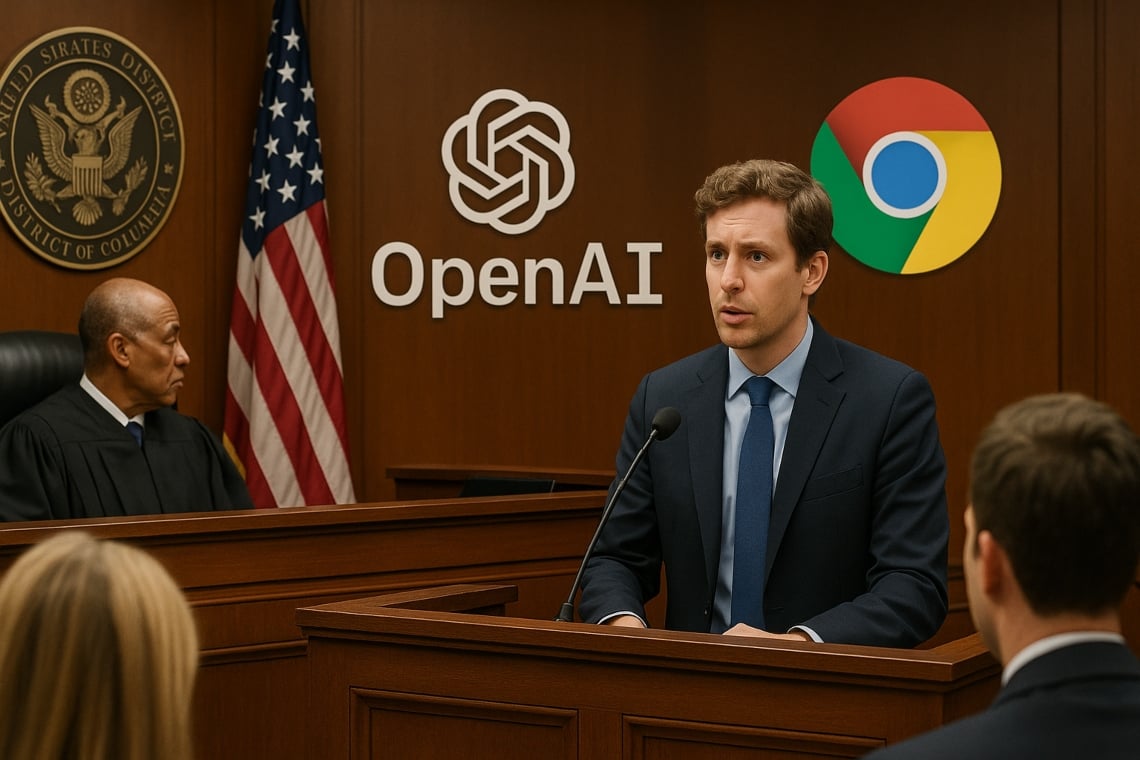According to an official statement released at the federal court in Washington, OpenAI is strongly interested in purchasing Google Chrome if Alphabet were forced to sell it.
Confirming it in front of the court was Nick Turley, Head of Product at ChatGPT, outlining a scenario that could rewrite the rules of online search and digital advertising.
Chrome, strategic asset in the sights of OpenAI
The United States Department of Justice has initiated a wide-ranging legal action against the Google ecosystem, accusing it of maintaining a dominant position in online search and related advertising.
The American authorities believe that Google has violated the rules on free competition by making exclusive agreements and exploiting its own tools, primarily the browser Chrome, to consolidate its supremacy.
Judge Amit Mehta has already recognized the monopolistic nature of the Mountain View giant, paving the way for drastic remedies.
Among the hypothesized solutions is the dismissal of Chrome itself, considered one of the sharpest arrows in Google’s quiver: the browser indeed channels an enormous amount of search queries to its engine, strengthening its position in the market.
Chrome is not just a browser, but a platform through which a substantial portion of global web traffic passes. The fact that OpenAI is ready to purchase it demonstrates how ambitious the vision of the company led by Sam Altman is.
A potential acquisition would represent a groundbreaking shift: OpenAI would move from being a mere *partner tecnologico* to a protagonist in the ricerca web sector, which has been dominated by Google until now.
“`html
An emancipation from Microsoft and Bing
“`
Currently, OpenAI collaborates closely with Microsoft, which was among its first financiers and continues to support its development.
Already today, some features of the popular ChatGPT are based on Bing, Microsoft’s search engine. However, Bing holds only 12% of the market, an insignificant figure compared to Google’s 78%.
Owning a browser like Chrome, already widely used and ingrained in the daily habits of users, would allow OpenAI to progressively reduce dependence on Bing.
Furthermore, it would pave the way for a proprietary search system powered by artificial intelligence.
The combination of a powerful browser and an AI-centric search engine could introduce a new era for the web: more predictive, conversational, and centered on the real needs of the users.
During the testimony at the trial, Turley revealed that OpenAI had already attempted in the past to collaborate with Google, proposing the integration of its search technology within ChatGPT.
The response from Google? A flat refusal. This episode reveals a latent rivalry between the two companies, but also OpenAI’s desire to occupy an increasingly larger space in the contemporary technological landscape.
In light of these developments, it appears clear that OpenAI does not intend to limit itself to the role of a provider of artificial intelligence solutions, but aims to become a structural player in the global digital ecosystem.
A potential acquisition of Chrome would drastically accelerate this transition, transforming OpenAI into a complete platform, equipped with its own channels to distribute and monetize the content generated by AI.
Impacts on the digital ecosystem: new balances in sight
The possibility that Chrome might be taken from Google and absorbed by a rapidly rising company like OpenAI creates a significant fracture in the pre-existing balances. Such a development would influence:
- – The world of browsers, forcing the other players, from Safari to Firefox, to revise their strategies.
- – The digital advertising sector, where Google derives the majority of its earnings.
- – The dynamics of motori di ricerca, introducing potential alternative models based on generative AI.
One thing is certain: if the antitrust authorities continue with the current approach, forcing Alphabet to separate from its key tools, a window of opportunity will open for new competitors. And OpenAI seems determined to ride the wave of change.
Founded to promote transparent and beneficial artificial intelligence, OpenAI quickly evolved from an experimental lab to a global benchmark.
With the success of ChatGPT and its advancements in the field of conversational AI, the company has demonstrated its ability to compete with the technology giants.
The potential entry into the browser and web search market would represent a natural extension of its mission. That is, to transform the way people interact with information.
This scenario brings to mind the historical turning points that in the past have marked the advent of new technological paradigms.
From the arrival of Google’s search engine in the early 2000s, to the introduction of social media up to the explosion of smartphones: now, artificial intelligence could be the next step.
The ongoing antitrust trial against Google has opened previously unthinkable scenarios. The interest of OpenAI for Chrome not only raises questions about the future of Google’s dominance, but also highlights the growing role of artificial intelligence in the major balances of technology.
If the Mountain View browser were to actually change ownership, we might be facing a new era for online search. An era in which leadership is no longer a matter of links, but of artificial intelligence and predictive capability.
And OpenAI, from what emerges, is ready to take on the challenge.
